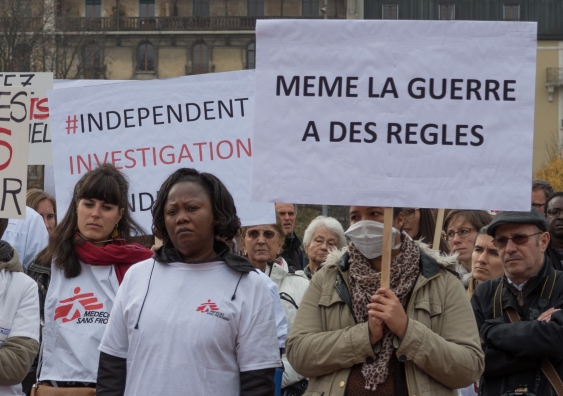Kunduz investigation raises fresh questions
The US bombing of a hospital in Afghanistan is a stark reminder that the West should not allow international humanitarian laws to be eroded, writes Susanne Schmeidl.
The US bombing of a hospital in Afghanistan is a stark reminder that the West should not allow international humanitarian laws to be eroded, writes Susanne Schmeidl.

OPINION: The Kundez hospital bombing raises questions about how the West fights its wars.
The long awaited findings of a US military investigation into the bombing of a Médecins Sans Frontières (MSF) hospital in the northern Afghan city of Kunduz on 3 October have been announced. The findings should sit rather uncomfortably with those who advocate for stepping up the aerial campaign in Syria against ISIS.
A month ago, MSF documented that the aggressive Russian bombing raids over northern and central Syria “have hit at least 12 hospitals in recent weeks, killing at least 35 patients and medical staff and wounding more than 70 others”.
With France having joined the war against ISIS after the recent terror attacks in Paris, it might be time to pause and take stock of the consequences of such aerial campaigns, aside from more civilian deaths and refugees. After all, what happened in Kunduz is unlikely to be a one-off incident.
Kunduz is a stark reminder that it never pays to rush into any kind of aggressive act, nor does it pay to allow an erosion of international humanitarian law, regardless of who the West is fighting.
The 3000-page report from the US military has not been publicly released but the findings could almost be a comedy if the circumstances weren't so tragic, coming from one of the world's most efficient military organisations with access to the latest technical gizmos.
The story however, shows more than just human error, and the problem is unlikely to go away if the blame shifts solely to individual soldiers without addressing the underlying question of how the West fights wars.
Kunduz, after all, is not the first and won't be the last such “tragic mistake” by the US military.
Perhaps it is time for a system overhaul, or possibly an urgent effort to address what I feel has been a slow erosion of human rights within military circles due to the frustratingly long wars in Iraq, Afghanistan, Iraq and now Syria against non-state adversaries not bound by the Geneva Convention and who care little about international humanitarian law.
But let's return to Kunduz and that fatal night.
It started with a C-130 gunship crew taking off and forgetting the list of non-strike targets. Then key electronics on board the aircraft failed and with it the ability to communicate in real time. The crew could not find their initial target, and when their targeting system became misaligned they still decided to go ahead with their mission, aiming for visual identification instead.
Let's remember, it was night. When they found a target that looked right and was approximately in the right location (500m looks like nothing from the air), they radioed in their new target to US personnel who had the no-strike list but did not bother to double-check. After all, it was 2am and “the Special Forces members in Kunduz had been fighting continuously for days and were fatigued”.
Rightfully, MSF General Director Christopher Stokes is outraged “that 30 people were killed and hundreds of thousands of people are denied lifesaving care in Kunduz simply because the MSF hospital was the closest large building to an open field and ‘roughly matched’ a description of an intended target”.
That is what the military considers a sad combination of human error, and technical and procedural failures.
The US military needs to learn from its mistakes and look deeper into why these human errors continue to happen and how they can be prevented.
Perhaps it takes such high-profile events to shake the US military into action, as previous bombings that led to civilian casualties (Afghan, Iraqi, Syrian) have not necessarily changed how things are done and how these kinds of wars are fought.
As already noted, this is particularly important as more countries join the Syrian civil war.
Perhaps the US military's rules and regulations regarding bombings, especially in populated and dense urban areas, need better checks and balances to correct mistakes by tired humans who might simply want to “get a job done”.
Perhaps it takes a renewed training effort that reminds military personnel about the importance of international humanitarian law, how it came about and why it matters.
And perhaps the US military and its allies simply need to ensure they approach the problem in a Malcolm Turnbull-like fashion: measured, proportionate and reasonable.
Kunduz is a stark reminder that it never pays to rush into any kind of aggressive act, nor does it pay to allow an erosion of international humanitarian law, regardless of who the West is fighting.
Foresight is called for, not hindsight.
Susanne Schmeidl is a lecturer in Development Studies in the School of Social Sciences at the UNSW.
This opinion piece was first published in The Interpreter.